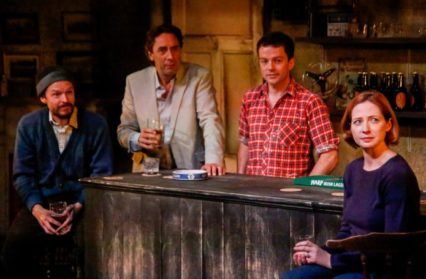Emily Garside reviews The Weir by Connor McPherson, A Sherman Cymru and Tobacco Factory Theatres co-production.
There’s much to be said for good old fashioned storytelling, and often not enough credit given to the art of it on stage or off. Luckily Connor McPherson is the modern master of storytelling across all his works, and The Weir is one where the characters, and McPherson, are given freedom to truly illustrate that art.
As director Rachel O’Riordan notes, ‘Written in 1997 The Weir is set in Ireland, a country on the brink of chance, and is perhaps as relevant in these shifting times as it was then.’ The idea the play invokes – of a moment captured in a community just before everything changes – is a resonant one in the turbulent climate in which we find ourselves today, and it’s little wonder the play continues to be staged. The characters, stranded in a rural village, are at once separate from the world around them but not so far away it doesn’t affect them. The idea of the road passing by Brendan’s house gives a neat nod to the world outside of both this village and this moment.
The past and its pivotal moments is the major theme of the play. The real-time narrative is the introduction of a newcomer to the village, Valerie, accompanied by Finbar. The real thrust of McPherson’s piece is the stories told by those who assemble around them.
From Finbar’s tale of being spooked as a young man, through tales of Faery Roads in the village, to Jim’s equally unsettling tale of men visiting their own graves. There is much of the supernatural undercutting the stories, the sense of there being ‘something else’ in each of the scenes the characters have encountered. They question what they know and who they might be. In the hands of a lesser writer and a lesser cast, it may have ended up ridiculous, laughable even, (although there are many laughs along the way – the line about the ‘Luigi’ board is particularly memorable). These are masterfully told tales the characters deliver in monologues which reveal as much about themselves as they do the more fantastical elements of the stories.

These nuanced, challenging, but ultimately very real, characters are in the hands of a talented group of actors. Simon Wolfe, returning to the role he played at The Royal Court in 2001, is on the surface a grumbling, set-in-his-ways, middle-aged man, but Wolfe brings out the undertones of a gentle, caring man who values the people around him greatly. Wolfe delivers the story of Jack’s one lost love with heart-breaking sincerity. Meanwhile, Steven Elliot as Finbar has the broader, brasher character, but also manages to convey elements of the man beneath the expensive cream suit, as well as his questions about where he might now belong in this community.
However, Orla Fitzgerald’s considered and moving performance as Valerie is the most intriguing and affecting of the characters. Delivered with an emotional strength and vulnerability, she never veers into sentimentality. Patrick Moy’s Brendan and Richard Clements’ Jim, although less dominant characters, provide equally nuanced performances. Moy’s character has the difficult role of being the often silent observer. From his wordless communications he conveys a genuine affection and shared history with his pub regulars, before delivering his astute comments that both amuse and cut to the truth of a scene.
Over the course of the play (a compact hour and forty minutes) the audience becomes immersed, as if they were the much talked about ‘Germans’ who are set to ‘invade’ this pub soon, sat and observing an evening in the pub. Kenny Miller’s set design perfectly creates the smoke stained run down interior of a pub last decorated in the 1970s. Seemingly frozen in time it also becomes an extension of barman Brendan, who leans, moves and at times becomes almost one with his familiar bar furniture. Atmospheric in its homeliness, subtly lit, even from the rear of the auditorium it feels like being inside the small pub. Effective light and sound accompany the character’s stories with haunting winds.
Rachel O’Riordan has directed a precise and subtle production of a play that specialises in wandering tales. To bring out the nuances and exacting moments to communicate so clearly to an audience McPherson’s narrative, and the implications beyond, is a great achievement. And in the hands of a talented and intelligent cast, the stories and the art of storytelling really fly.
The Weir is a Sherman Cymru and Tobacco Factory Theatres co-production.
(Image credit: Nick Allsop)











